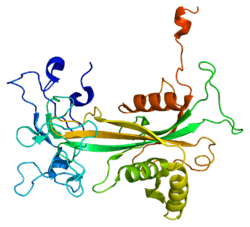NUDT9
ADP-ribose pyrophosphatase, mitochondrial is an enzyme that in humans is encoded by the NUDT9 gene.[5][6][7]
References
- 1 2 3 GRCh38: Ensembl release 89: ENSG00000170502 - Ensembl, May 2017
- 1 2 3 GRCm38: Ensembl release 89: ENSMUSG00000029310 - Ensembl, May 2017
- ↑ "Human PubMed Reference:".
- ↑ "Mouse PubMed Reference:".
- ↑ Perraud AL, Fleig A, Dunn CA, Bagley LA, Launay P, Schmitz C, Stokes AJ, Zhu Q, Bessman MJ, Penner R, Kinet JP, Scharenberg AM (May 2001). "ADP-ribose gating of the calcium-permeable LTRPC2 channel revealed by Nudix motif homology". Nature. 411 (6837): 595–9. PMID 11385575. doi:10.1038/35079100.
- ↑ Perraud AL, Shen B, Dunn CA, Rippe K, Smith MK, Bessman MJ, Stoddard BL, Scharenberg AM (Jan 2003). "NUDT9, a member of the Nudix hydrolase family, is an evolutionarily conserved mitochondrial ADP-ribose pyrophosphatase". J Biol Chem. 278 (3): 1794–801. PMID 12427752. doi:10.1074/jbc.M205601200.
- ↑ "Entrez Gene: NUDT9 nudix (nucleoside diphosphate linked moiety X)-type motif 9".
Further reading
- Lin S, Gasmi L, Xie Y, et al. (2002). "Cloning, expression and characterisation of a human Nudix hydrolase specific for adenosine 5'-diphosphoribose (ADP-ribose)". Biochim. Biophys. Acta. 1594 (1): 127–35. PMID 11825615. doi:10.1016/S0167-4838(01)00296-5.
- Strausberg RL, Feingold EA, Grouse LH, et al. (2003). "Generation and initial analysis of more than 15,000 full-length human and mouse cDNA sequences". Proc. Natl. Acad. Sci. U.S.A. 99 (26): 16899–903. PMC 139241
 . PMID 12477932. doi:10.1073/pnas.242603899.
. PMID 12477932. doi:10.1073/pnas.242603899. - Zhang HT, Yan ZQ, Hu XB, et al. (2004). "Interaction of C17orf25 with ADP-ribose pyrophosphatase NUDT9 detected via yeast two-hybrid method". Sheng Wu Hua Xue Yu Sheng Wu Wu Li Xue Bao. 35 (8): 747–51. PMID 12897971.
- Shen BW, Perraud AL, Scharenberg A, Stoddard BL (2003). "The crystal structure and mutational analysis of human NUDT9". J. Mol. Biol. 332 (2): 385–98. PMID 12948489. doi:10.1016/S0022-2836(03)00954-9.
- Clark HF, Gurney AL, Abaya E, et al. (2003). "The secreted protein discovery initiative (SPDI), a large-scale effort to identify novel human secreted and transmembrane proteins: a bioinformatics assessment". Genome Res. 13 (10): 2265–70. PMC 403697
 . PMID 12975309. doi:10.1101/gr.1293003.
. PMID 12975309. doi:10.1101/gr.1293003. - Ota T, Suzuki Y, Nishikawa T, et al. (2004). "Complete sequencing and characterization of 21,243 full-length human cDNAs". Nat. Genet. 36 (1): 40–5. PMID 14702039. doi:10.1038/ng1285.
- Gerhard DS, Wagner L, Feingold EA, et al. (2004). "The status, quality, and expansion of the NIH full-length cDNA project: the Mammalian Gene Collection (MGC)". Genome Res. 14 (10B): 2121–7. PMC 528928
 . PMID 15489334. doi:10.1101/gr.2596504.
. PMID 15489334. doi:10.1101/gr.2596504. - Otsuki T, Ota T, Nishikawa T, et al. (2007). "Signal sequence and keyword trap in silico for selection of full-length human cDNAs encoding secretion or membrane proteins from oligo-capped cDNA libraries". DNA Res. 12 (2): 117–26. PMID 16303743. doi:10.1093/dnares/12.2.117.
- Carloto A, Costas MJ, Cameselle JC, et al. (2006). "The specific, submicromolar-Km ADP-ribose pyrophosphatase purified from human placenta is enzymically indistinguishable from recombinant NUDT9 protein, including a selectivity for Mn2+ as activating cation and increase in Km for ADP-ribose, both elicited by H2O2". Biochim. Biophys. Acta. 1760 (10): 1545–51. PMID 16860484. doi:10.1016/j.bbagen.2006.06.003.
This article is issued from
Wikipedia.
The text is licensed under Creative Commons - Attribution - Sharealike.
Additional terms may apply for the media files.







